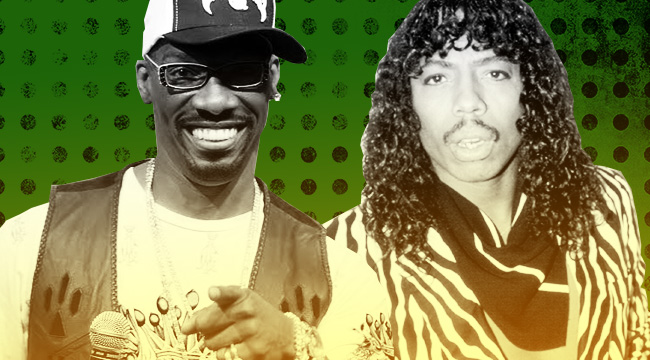
Man, Charlie Murphy died. Time keeps moving forward, and more of our heroes from the past are getting older, and passing way — but this one really hurts. Yesterday we lost, Charlie Murphy, who went from being actor-comedian Eddie Murphy’s older brother, to becoming a star of the stand-up stage in his own right. Charlie was the quintessential overnight success, starting as a bit player, an entourage member, a hanger-on, and transitioning into one of the most well-known comedians in America.
The moment it all changed for him was one particular sketch on Chappelle’s Show, which was just beginning to get popular at that time in the early 2000s. Chappelle had created a sketch comedy series of goofball musings which developed a reputation for pushing the line on comedy; from a vision-impaired, black man who blindly identified as a White supremacist, to a potty-mouthed send-up of R. Kelly’s sexual proclivities, Chappelle had shown a gift for satirizing society’s heroes with an irreverent, stoner-visioned bent.
The sketch that launched Charlie into public consciousness was especially ridiculous for two reasons. One, it asked us to take seriously a largely unknown comedian whose primary resume credential was being “Eddie Murphy’s brother.” Two, the entire premise of the sketch was the recounting of a 25-year-old series of encounters with cocaine-addled, former funk-soul superstar Rick James at the height of his fame — and his addiction. James, living high on the hog/white horse, mercilessly bullies Charlie over his much darker complexion and his considerably smaller public imprint by violently attacking him and ruining a brand new couch.
[protected-iframe id=”7da72e23de5929796aefcd5dd919ada8-60970621-76566046″ info=”//media.mtvnservices.com/embed/mgid:arc:video:comedycentral.com:98f4b81c-ed00-11e0-aca6-0026b9414f30″ width=”650″ height=”360″ frameborder=”0″ allowfullscreen=””]
Now, if you were 19 years old, as I was at the time, the most recollection you had of James’ relevance was that his song “Superfreak” had been sampled by the early ‘90s Oakland rapper/punchline MC Hammer — and that he really liked weed. His other major jam of the era, the ganja classic “Mary Jane,” remains one of the best odes to the plant beloved of hippies, rappers, and slackers to this day. How apropos that James’ second shot at notoriety came from a similarly THC-saturated outlet like Chappelle’s Show, a favorite of the dorm room midnight munchies set. It was truly the only possible platform for Murphy’s understated, regular guy wit to flourish the way it did, as the imaginative sketches allowed him to inhabit various outlandish characters — from a scumbag Oscar the Grouch knockoff in “Knee-high Park,” to pimp-suited, player-hating Buc Nasty — that put his full comedic range and personality on display. However, as luck would have it, Murphy’s best character from the show turned out to be himself.
None of what was going on in this sketch would’ve worked, however — or even registered as funny at all — without the emphatic, incredulous delivery of the storyteller. Murphy sounds just as bewildered as the audience at his sudden inclusion in the bizarre goings-on, as re-enacted by Chappelle in an over-the-top performance of a psychotic Rick James. Chappelle’s wigged, gold-toothed James rampages through Murphy’s 1980’s club recollections, smacking Charlie in the face as a gag, destroying a couch with muddy platform boots, and generally causing mayhem, all while demeaning his poor, less-famous victim with the belittling nickname of “Darkness.” Murphy gets the last laugh, though, ending the mayhem by kicking Chappelle’s James through a mirror in a hotel room, and prompting an apology for his outrageous behavior. Then, the sketch is capped off with one final vindication for Murphy, an open admission from the real Rick James (!) that the entire story is true, and that ”cocaine is a hell of a drug.”
That sketch might have been the funniest thing on TV ever, and it still stands as one of the standards by which all other comedy sketches are measured even now — closely followed by another of Charlie’s “True Hollywood Stories,” this one involving the legendary Prince and an impromptu, after-the-club game of basketball. Poor Key And Peele couldn’t catch a break on the internet due to the popularity of Chappelle’s Show; even their best sketches on their own show were met with damning praise: “It was funny, but nowhere near the Rick James sketch.” The ubiquitous cry of “I’m Rick James, b*tch!” became a sort of tagline by which fans of the show could identify themselves to each other — and to the show’s creator, to Dave’s eternal chagrin (See: the comedian’s special For What It’s Worth for his hilarious experiences with overzealous fanboys).
“Charlie Murphy’s True Hollywood Stories” resonated with fans so strongly that it changed public discourse with the nature of celebrity. Suddenly, the biggest comedians in the world were normal, approachable guys that you could tell obscenities to at Disneyland (please don’t actually do this), and rockstars like James and Prince became goofball screwups with odd hobbies like midnight pick-up games in full eighties performance glam. Rick James especially received a bump (no pun intended) in popularity, as his name became practically synonymous with drug-fueled shenanigans and habitual line-stepping, all due to the relatable, yet somehow still not-entirely-reliable narration of a guy once best remembered as a bit cameo player in his brother’s movies (shout-out to MC Gusto!).
After the sketch in question aired, Charlie Murphy went from nobody — just a sibling standing in his more-recognizable brother’s considerable shadow — to a household name. Even if that name is forever associated with other late stars of the eighties like James and Prince, it’s a name people remember, and one we will all miss. Charlie Murphy changed comedy with his true Hollywood stories, and it won’t be the same without him around to tell them. It’s a shame, because his own story might be the most interesting one of all.
Aaron Williams is an average guy from Compton. He’s a writer and editor for The Drew League and co-host of the Compton Beach podcast. Follow him here.






